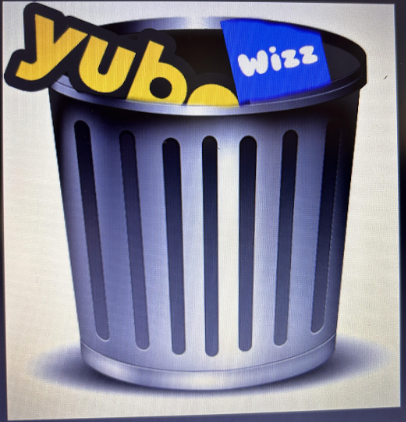Yubo and Wizz are harmful to teens

June 5, 2023
After a long day of school you make your way to the park to meet the boy you have been speaking with over the app Yubo. You take a seat on the park bench patiently waiting for the handsome, brown-haired boy to show up. The excitement you feel is quickly turned to fear and confusion as an older man approaches you saying your name. This can’t be happening.
Yubo and Wizz, like Tinder for teens. Swiping left or right on photos of random people from other countries or states; these apps were targeted to teens so they could use them to socialize and make friends, but both apps are used very differently than intended.
Yubo is an app that was released in 2015 and became very popular amongst teens in 2020. It is advertised as a fun app where you can make new friends, though many people did not use it that way. When you download this app, you have to add at least three photos to your profile and then give a description of yourself in your bio. Once you’re logged in, you can swipe either left or right on people, depending on your opinion towards them. Sounds a lot like Tinder to me. Most use it for dating as they were likely very lonely during quarantine. Obviously there are chances you can be catfished but that could happen on any app like this. Wizz is similar to Yubo, the only difference is the age requirements.
Yubo and Wizz are advertised on the app store and all over social media as a, “Meeting friends around the world” kind of app. Yubo’s age requirement is 17+, and Wizz is 12+. Although the age limit for Yubo is 17, many younger kids have created an account. For Yubo users under 17 can put their real birthday and not be stopped from using the app. As for most apps such as Snapchat, if the user is not old enough they will be stopped from using it or will need their parent/guardian’s permission. Many who are too old, way over the age of 18, will also go onto this app to prey on younger kids, knowing many do use these apps.
Once you have downloaded the app you’re asked to create an account and add a minimum of 3 photos or videos of yourself and your birth date. Next you add a bio, “tell us about yourself” . Many people use this section to add their best pickup line, sexual orientation, pronouns and race. Next you add “tags”. This is where you can choose your interests in pretty much everything like music, gaming, sports, movies and even more. Then you are ready to use the app. Once you’re in you’re shown to a page where you will see the people you can swipe on. You swipe left if you don’t like what you see, and right if you do. Then maybe you’ll make your match and you can chat with them through the app.
After these few steps the user is able to use the app freely, prey on younger kids, catfish, bully, and even more! By simply just looking up the description of any person on google someone can easily catfish and communicate with other users. Most of the bullying goes on in the live section part of the app (Yubo). Users can start a live video with their friends or maybe other random people. They are able to see who joins their live video and also view their accounts. The users on the live video will go on the viewers account and say downright rude things about their appearance or rate their looks.
Out of 33 WO students interviewed, 61% of them have used Yubo or Wizz. Their experiences were mostly negative.
Soph. Anjalina Chanthavong said, “I remember I was on Wizz and I saw my [now] ex boyfriend on there trying to get other girls’ attention while with me, so I broke up with him.” Many teens will just go on there for the attention and wanting their egos boosted. Chanthavong had a different experience finding out that her significant other, the person who was supposed to be loyal and committed, was on Wizz. Many people have had the similar experiences with these apps: that they were trashy or using the app was just down right a horrible experience. Soph. Madison Blade said, “It has some fine boys on there but they are rude.”
Soph. Naylea Ramierez said, “Worst idea ever. There’s so many weridos and creeps on there asking for pictures.” While on this app you run into quite a few weird people. People will ask for explicit photos and say very inappropriate things, which may make the user uncomfortable, and this happens much too often on these apps.
If Yubo and Wizz were used right
If the apps had more privacy and security they could potentially be used for good rather than bad. Specifically if the apps were more strict on the users age rather than letting them pass without question if they are underage they could actually set their rules into place. Sometimes people need an escape from the real world and connecting with people online can help satisfy that need. It’s never a bad thing to make new friends, whether they are online or in person.
Negative effects on teens
These apps can be very harmful toward teen minds. Considering the fact there are people on the apps who are just out to get others, there’s definitely a lot of toxicity going in and coming out of them. Teens’ confidence and self-worth can be brought down just by the words of others. This has very harmful effects on users because finding self worth and value in yourself is a long and difficult process on its own. Teens do not need the unnecessary stress of seeking validation from others. Especially if those people have harmful or insincere intentions.
Yubo and Wizz can also give teens a negative aspect on dating in the real world. Teens may be taught the wrong lessons about what a relationship should look like. People with bad intentions might find someone who is willing to fill their sexual needs. The victim of that person could be taught that sending explicit photos to their significant other is love. This also could make the teen feel that they need sexual validation from their next relationship or just in general, as every relationship has an effect on the next.




